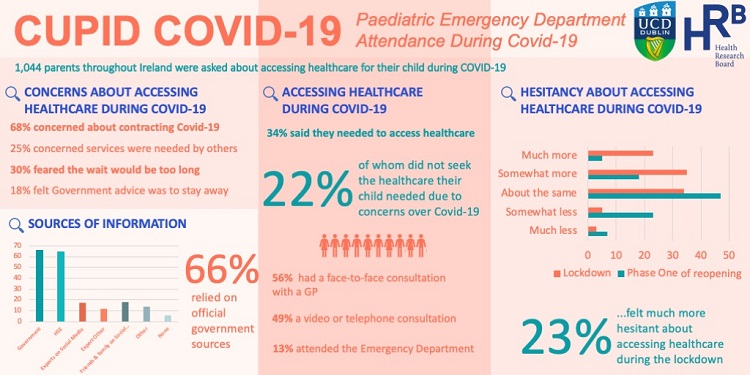22% of parents avoided accessing healthcare for their children over COVID-19 concerns, national survey finds
Posted 1 July, 2020

Nearly a quarter of parents requiring healthcare for their children chose not to access the relevant service because of fears over COVID-19.
Researchers from the (opens in a new window)UCD Centre for Interdisciplinary Research Education and Innovation in Health Systems (IRIS) found that 34% of parents in Ireland needed to access healthcare for their child but among these 22% decided not to due to concerns about the coronavirus.
The experience of parents in need of healthcare for their children during the recent lock-down was assessed by the CUPID COVID-19 National Parents Survey.
It findings show that 68% of parents were concerned about contracting COVID-19. Among those who did access healthcare for their child, 56% had a face-to-face consultation with a GP and 49% had a video or telephone consultation.
Only 13% attended the emergency department, with 5% saying they accessed another service.
Of the 1044 parents surveyed, nearly one in five misunderstood official public health advice and thought the Government had told them to stay away from health services.
Preliminary results from our survey of parents on experiences of seeking healthcare for their children during COVID funded by (opens in a new window)@hrbireland (opens in a new window)@ThereseMcDonn (opens in a new window)@UCDHealthSystem (opens in a new window)@PEMDublin (opens in a new window)@conorhensey (opens in a new window)@REDSPoT_IE More info here: (opens in a new window)https://t.co/9b3IQPMLTq (opens in a new window)pic.twitter.com/7SWh5jAZQC
— Emma Nicholson (@EmmaNich97) (opens in a new window)June 30, 2020
Asked about where they found healthcare information during the lock-down, 66% of parents said they relied on official government sources, while 29% said they sought information from experts on social media or other online resources.
The survey was conducted at the end of May and forms part of a wider 12 month study being carried out to assess the impact of COVID-19 on accessing paediatric emergency healthcare in Ireland.
Project leads (opens in a new window)Dr Emma Nicholson and (opens in a new window)Dr Thérѐse McDonnell, (opens in a new window)UCD School of Nursing, Midwifery and Health Systems, said: “The results indicate parents’ felt hesitant about using healthcare services for their children during the lock-down period, and a proportion avoided accessing necessary healthcare.
“This has implications for public health messaging as the COVID-19 pandemic plays out. Decision makers will need to ensure messaging is clear and does not encourage avoidance behaviour, which can have severe consequences for the health of children, particularly those with complex conditions or particular health needs.”
The CUPID COVID-19 project is funded by the Health Research Board in conjunction with the Irish Research Council under the Government’s COVID-19 Rapid Response call.
By: David Kearns, Digital Journalist / Media Officer, UCD University Relations (with materials from Caroline Byrne, UCD Research and Innovation)






